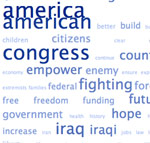Ecologo is an excellent example of a Government of Canada consumer data and information service that facilitates the making of informed decisions on how and what to consume.
I discovered it this morning while reading an article about greening computers in the Globe and Mail. I pay attention to electronic waste on my personal blog but think Ecologo is also relevant here as it is a program that provides data on green consumer product certification to Canadians using a rigorous review system. There is also a tinge of national pride here when I read the following even though I know that Canada as a green country is a myth, nonetheless Ecologo was:
launched by the Canadian federal government in 1988, EcoLogo is North America’s oldest environmental standard and certification organization (and the second oldest in the world). It is the only North American standard accredited by the Global Ecolabeling Network as meeting the international ISO 14024 standard for Type I (third-party certified, multi-attribute) environmental labels.
Environment Canada has always been excellent at developing sustainability and other quality of life criteria and monitoring measures. It is one of those interesting departments that is both science and policy, and they stick to good science in their methods to communicate, evaluate and disseminate – budgets permitting of course!
EcoLogoM certification criteria documents (CCDs) are developed in an open, public and transparent process, with a broad base of stakeholder participation including user groups (e.g. procurement associations, institutional purchasers and consumer protection organizations), product producers (e.g. industry members and associations), government / regulators, general science-based representatives (e.g. academics, life cycle experts and other scientists), environmental non-governmental organizations (ENGOs), and other environmental advocates. The criteria address multiple environmental attributes related to human health and environmental considerations throughout the life cycle of the product. Currently, there are 122 Certification Criteria Documents addressing over 250 product types.
You can look up just about anything and discover products in their impressive list. I like that there is a rigorous system in place that is about making informed choices. This is what data are for! They also have an excellent purchaser’s tool box organized by product, category or company.
Hmm! Wonder if we could ever develop a criteria to evaluate organizations on their access, preservation and dissemination of data? What would be the key criteria in such an evaluation? Would an organization get a Free and Open Knowledge certificate (the acronym is terrible! we need Michael Lenczner‘s help here!)? A CivicAccess gold, silver or bronze stamp of data democracy and liberation?

Comments on Posts